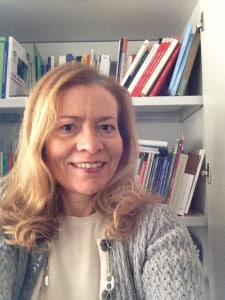
“A terminologist must know terminology strategies for business processes, if he/she works in companies which require translation, and be conscious of the relevance of terminological choices in institutional communication as well as in marketing needs”. – Interview with Maria Teresa Zanola.
Maria Teresa Zanola is full professor of French language and translation at the Università Cattolica del Sacro Cuore of Milan, where she is Director of the Linguistic Centre and of the “Osservatorio di terminologie e politiche linguistiche” (Observatory for terminologies and language policies, OTPL). Scientific French lexicon specialist, she has investigated neologisms in French specialized vocabulary from a diachronic point of view. She is also the author of important essays in the field of terminology: from the standardization to the results of multilingual products and to the topics related to language policies. She is President of the Italian Association for Terminology (Associazione Italiana per la terminologia – Ass.I.Term) and General Secretary of REALITER, the Pan-Latin network of terminology.
1. Annalisa Galeone: Prof. Zanola, what does “dealing with terminology” mean in Italy? Can you give us an example?
Maria Teresa Zanola: In Italy terminology plays a fundamental role in three areas:
– in scientific and technical translations;
– in linguistic services of public institutions and private companies;
– as a skill that professionals must possess in medical, financial and legal fields.
In the Italian context, dealing with terminology often means to settle a dispute caused by an incorrect transposition of concept using the wrong term; a significant example is the “pelle – ecopelle question”. The matter has been brought up by the Unione Nazionale Industria Conciaria (one of the biggest association in the world operating in the field of tanning) and concerns the misuse of the term “ecopelle” (ecoleather). The diffusion of the concept of ecopelle as a synthetic product that looks like genuine leather dates back the beginning of the ‘90s. The key issue is the meaning of the prefix eco- used for words that relate to ecology or environment. The link with ecology leads consumers to consider ecoleather as an alternative material to genuine leather, distinguished by a reduced environmental impact, but actually what seems to be an eco-friendly solution is extremely polluting, due to the fact that this material is obtained from oil. The real meaning of ecoleather maintains the link with ecology but in a different way, since it refers to the reduced environmental impact of the tanning processes of animal skins, so it has nothing to do with plastic or oil.
Thanks to an awareness campaign conducted by Ass.I.Term in television interviews and thanks to the description of the topic in many seminars, it has been possible to restore the correct use of the term. This success is proven by the entry ecopelle in the dictionary of the Italian language Zanichelli, 2012 edition, which provides the correct meaning of the term.
2. Annalisa Galeone: Member of the Italian Association for Terminology since 1999, President in office since 2010, what are the objectives you want to achieve with the association?
Maria Teresa Zanola: Ass.I.Term is a scientific and non-profit association born with the aim of connecting the sectors involved in the study and dissemination of languages for specific purposes: public administration, universities, institutes of research and standardization, publishing, industry, schools for interpreters and translators and language professionals and documentation. It was founded and established in Rome in 1991 by Giovanni Adamo, Laura Bocci, Luigi Muzii, Giliola Negrini, Claudia Rosa, and Piero Trentin on behalf of Union Latine who appointed Giovanni Adamo as the first secretary general. Giovanni Nencioni was the first elected President by the first general assembly a few months later. The latter decided to underline the need for a clear international communication in the technical and scientific field. Since that moment, the Association played an important role in the promotion of relations between scientific and professional operators in terminology, with the aim of encouraging the enrichment of scientific and technical information in Italian language by promoting the terminology of languages for specific purposes. Moreover, Ass.I.Term organizes an annual conference, whose results are regularly published in the website (www.assiterm91.it). The conferences show the relevance of the topics covered, the interest in hosting the most significant references to study and promoting projects and to collect results in the domain of the interrelation between terminology and knowledge. The objectives are:
– promoting relations between scientific and professional operators who use Italian terminology by organizing workshops and conferences, in Italy or abroad;
– encouraging enhancement of scientific and technical terminology in Italian and the collection of related information and knowledge;
– sharing and coordinating activities in the field of scientific and technical terminology;
– training in the field of studies and professions related to the production and management of terminology, even with the provision of grants or scholarships;
– contributing to the achievement of its goals with other national and international institutions.
3. Annalisa Galeone: We read that you are General Secretary of the Pan-Latin terminology network (REALITER). How does a “network” operate in the field of terminology?
Maria Teresa Zanola: Realiter is the Panlatin terminology network that brings together individuals, institutions and organizations of Neolatin languages speaking countries that operate in the field of terminology. The main objective the network wants t0 achieve is the development of Romance languages with regard to the technical and scientific terminology of areas of social relevance. In order to obtain these results, the network promotes collaborative projects aimed at the creation of multilingual terminology products in support of the various linguistic realities.
Realiter and Ass.I.Term cooperate in the creation of multilingual lexicons in various fields of knowledge (renewable energies, e-commerce, nanotechnology, to name a few).
4. Annalisa Galeone: We know that since 2010 Università Cattolica del Sacro Cuore of Milan offers a Master in languages and terminology, can you tell us about it?
Maria Teresa Zanola: The idea of centering an entire course of Master degree around the topic of terminology is the answer to the need of an effective and pertinent communication felt by institutions and companies. The Master degree in Languages and Terminology aims at the acquisition of the knowledge and competences necessary to operate in the field of terminology and specialized terminography. In order to achieve these objectives, the course provides with notions of linguistic, lexicography and translation, mixed with the basic scientific, economic and technological notions an adequate terminological formation must possess.
Apart from this course, since 2007 the Catholic University organizes a course in “Specialized terminologies and translation services”. This course improves the necessary competences in terminology for languages for specific purposes (LSP), as regards the creation, translation and communication in scientific, technical and commercial fields. The objective is the formation of professionals that can work in the fields of institutional, technical, medical and commercial communication.
5. Annalisa Galeone: According to your opinion which are the skills a professional terminologist must possess?
Maria Teresa Zanola: Apart from the evidence of having advanced linguistic and textual competences, a terminologist must know how to manage terminology: how to search and collect terms, how to store and retrieve them, how to manage monolingual and multilingual terminology and terminology projects. Moreover, a terminologist must know terminology strategies for business processes, if he/she works in companies which require translation, and be conscious of the relevance of terminological choices in institutional communication as well as in marketing needs.
6. Annalisa Galeone: At the beginning you’ve mentioned the existence of OTPL. What is the aim of a centre dedicated to the scientific research in the field of terminology?
Maria Teresa Zanola: Creating an Observatory is the result of the fundamental choice by the use of the proper terminology in specialized communication. It aims at investigating knowledge and skills in the field of terminology of the professions, in the fields of science and arts, legal and institutional field, economics and finance, technique and operational knowledge, and to study the resulting relationships with the development of language policies at a national and international level. As for the scientific research, the Observatory conducts basic and applied researches in the fields of foreign languages and cultures in order to create both multilingual and monolingual terminological products in areas that have economic and social importance. The work of OTPL includes three kinds of activities:
– developing lexicons, glossaries and thesauri (monolingual and bilingual); creating catalogues ofexisting terminological repertoires, analyzing the diversity of glossaries based on the user category; realizing terminographical products which are useful in different fields.
– providing advices on terminological issues for national and international companies: the precision and rigor of terminology (clarity of correspondence between name and definitional content) allow the unambiguous identification of the technical and economic production, resulting in transparency in corporate communication and training.
– researching, documenting and extracting terminology from corpora of different text types, in order to promote the harmonious development of specialized communication and dissemination of technical and scientific terminology.
7. Annalisa Galeone: Can you tell us about your collaboration with European Commission?
Maria Teresa Zanola: My collaboration with EC-DGT Italian section consisted in coordinating the economic and financial terminology group within the “Rete per l’eccellenza dell’Italiano istituzionale” REI, and taking part in the central committee for the organization of the “Giornate REI”, the scientific meetings in which all the most interesting points for Italian translators and terminologists are discussed. Among the most applied works, I can mention the revision and completion of a pack of terminological records EN / IT relating to financial terms (deriving from the term extraction on the 2006/48 EC and 2006/49 EC (Basel 2) directives).
Interviewer: Annalisa Galeone
Annalisa is Italian and she was born in The Netherlands in 1990. She graduated in Linguistic Sciences in September 2013 with the final mark 110 cum laude /110 with a thesis on a Marketing subject: the consumers’ experience of a very important international artisan EXPO of Milan, “L’Artigiano in Fiera”, and its e-commerce platform named “Make Hand Buy”.
In the period January to March 2013 Annalisa carried out a 3 months traineeship at the European Parliament, in Luxembourg, supporting the outreach services of the Terminology Coordination Unit. In addition to her Italian mother tongue, she can speak English, French, German, and Spanish. After achieving her graduation, she enrolled in a Media Relations and Communication MSc.
During her free time Annalisa loves drawing, painting, reading books and writing stories or articles; in addition she is very fond of musicals, operas, and theatre. Quoting Charlemagne, her motto is “To learn another language is to possess a second soul”.

